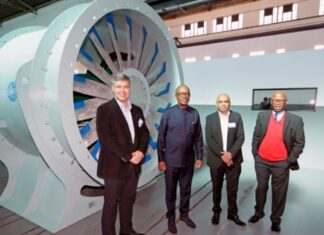THE City of Cape Town recently awarded a 5-star and 3-star rating to the Tygerberg and Bellville campuses for effective water management to ensure compliance with the Institution’s water licensing conditions.
Implementing water strategies at the Tygerberg campus resulted in a 40%reduction in potable water consumption. The Bellville campus used water from the adjacent deep lake to supply water to the desalination plant, which resulted in a substantial reduction of potable water with minimal supply from the city of Cape Town’s grid.
These water solutions resulted from work done more than a decade ago at Facilities Management when a cross-functional team developed the Green Business Plan, which detailed specific targets for various environmental sustainability elements. It has since evolved into the institution’s 2022 Environmental Sustainability Plan.
“Our Environmental Sustainability Plan stipulates that we must reduce the impact on the earth’s finite resources — energy and water. One of these strategies is the Water Optimization Strategy,” said SUFM’s Director of Property Services, Nadeem Gafieldien.
“While implementing these strategies in 2018, the Western Cape experienced the worst droughts. With Day Zero looming, we managed to fast-track our water optimization strategy. We turned this crisis into an opportunity by implementing these strategies, requiring changes in our systems to make them more resilient to future environmental crises.”
Gafieldien said they developed several water projects and initiatives and implemented them across the institution, including the Tygerberg and Bellville campuses. This included upgrading bulk infrastructure, boreholes at Tygerberg, a new deep lake system at the Bellville campus, changing shower heads, taps, and toilet cisterns from twelve to six liters, and implementing greywater systems.
Gafieldien said all these initiatives enabled them to reduce potable water consumption, with the added benefit of reducing the municipal bill, while building resilience in the institution’s water systems by optimising and diversifying this finite resource.”
“While this represented certain advantages, it also came with specific legislation and regulatory requirements. This legislation requires regular testing, management, reporting, and audits on the water quality as stipulated in the water licenses,” said Gafieldien.
SU’s environmental sustainability manager, John de Wet, confirmed that the Tygerberg campus’s water consumption is 11 638 kl monthly, which equates to six Olympic pools.
An estimated 9 514 kl, or the equivalent of five pools, is supplied by the municipality, and 2 124 kl, or one pool, comes from the Tygerberg campus from boreholes drilled in 2016. This initiative resulted in a 20% reduction in potable water supplied by the City of Cape Town and made us more resilient.
De Wet said the Bellville campus has a 50-meter-deep quarry; all rain and stormwater are collected in this lake.
“In 2018, SU implemented the deep-water lake projects at the Bellville campus. SU was allowed to pump water from the 52-meter-deep lake. We used this 12-degree water to supply water to three areas on the campus. Firstly, in the HVAC plant; secondly, in the filtration plant; and thirdly, to irrigate the landscape.
Raw water from the lake is filtered in the filtration plant (reversed osmoses), which supplies all campus buildings.”
John confirmed that this system produces an estimated 2 051 kl per month, equivalent to one Olympic pool of drinking water. According to him, this campus should theoretically not use potable water from the municipality. However, it is impossible due to the impact of load-shedding, as it reverts to the municipal water supply.
Gafieldien said that by adopting its environmental sustainability plan in 2022, SU is now on a new sustainable trajectory for carbon neutrality by 2030 and net zero by 2050.
Green building award
Furthermore, the Green Buildings Council of South Africa (GBCSA) certified our Biomedical Research Institute (BMRI) building with a 4-star rating as a newly built green building. The BMRI was SU’s first building to receive this certification from the GBCSA.
The GBCSA rating system includes energy efficiency, water, and waste management, using green materials and construction methods, indoor air quality, transport, land use, emissions, innovation, and productivity.
“Buildings consume 75 percent of the utilities and are the largest contributor to the institutions’ emissions and carbon footprint. Therefore, we focus on improving how we measure and report on the performance of our extensive portfolio of +450 buildings. We also ensure our buildings are much greener and reduce the impact on the environment and our planet,” said Gafieldien.















